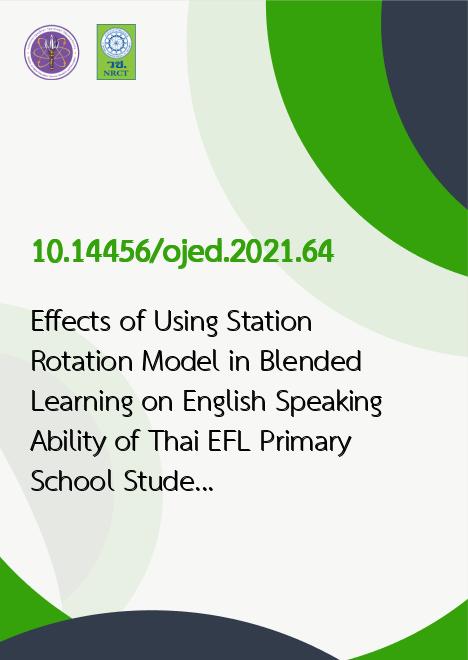
|
Effects of Using Station Rotation Model in Blended Learning on English Speaking Ability of Thai EFL Primary School Students |
|---|---|
| รหัสดีโอไอ | |
| Creator | Sujinun Pimpiban |
| Title | Effects of Using Station Rotation Model in Blended Learning on English Speaking Ability of Thai EFL Primary School Students |
| Contributor | Ra-shane Meesri |
| Publisher | Centre for Education Innovation, Print and Online Media |
| Publication Year | 2564 |
| Journal Title | An Online Journal of Education |
| Journal Vol. | 16 |
| Journal No. | 2 |
| Page no. | OJED1602048 (14 pages) |
| Keyword | blended learning, station rotation, English speaking ability |
| URL Website | https://so01.tci-thaijo.org/index.php/OJED |
| Website title | An Online Journal of Education |
| ISSN | ISSN 1905-4491 (Online) |
| Abstract | This study aimed to investigate the effects of an English instruction using station rotation model in Blended Learning on improving English speaking ability of primary school students and their attitudes towards the model. The participants were 41 fifth-grade students who were studying in the second semester of the academic year 2016 in a primary school in Sri Saket province, Thailand. They had different English ability levels. The instruments used in this study were pretest, posttest, and a questionnaire. The data were analyzed by using mean, standard deviation and t-test. The research findings were summarized as follows: 1) Participants’ English-speaking ability improved significantly. 2) Participants had positive attitudes towards the station rotation model after learning. The findings also suggest that the station rotation model can be implemented to enhance English speaking skills of EFL primary school students in Thailand. In order to implement this model to primary school students, the learner training should be clearly explained as suggested in this research. Furthermore, the effects of station rotation model in Blended Learning on other language skills should be explored in future research. |